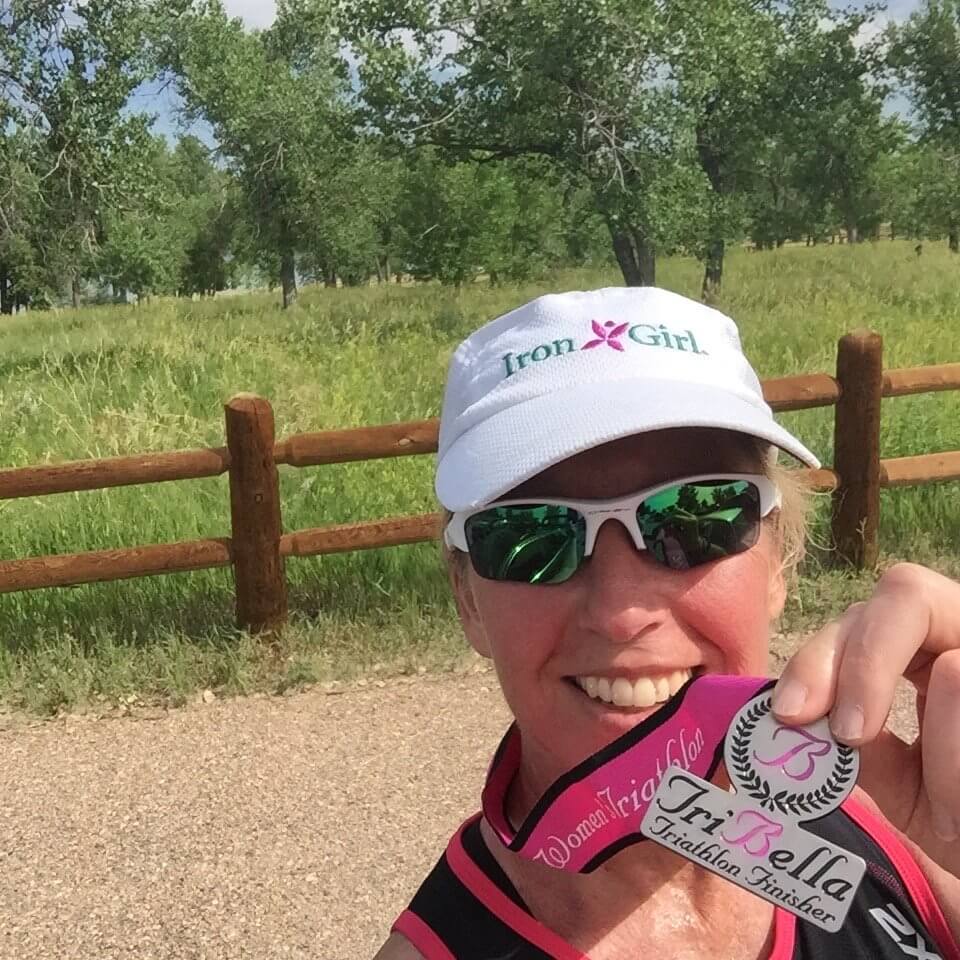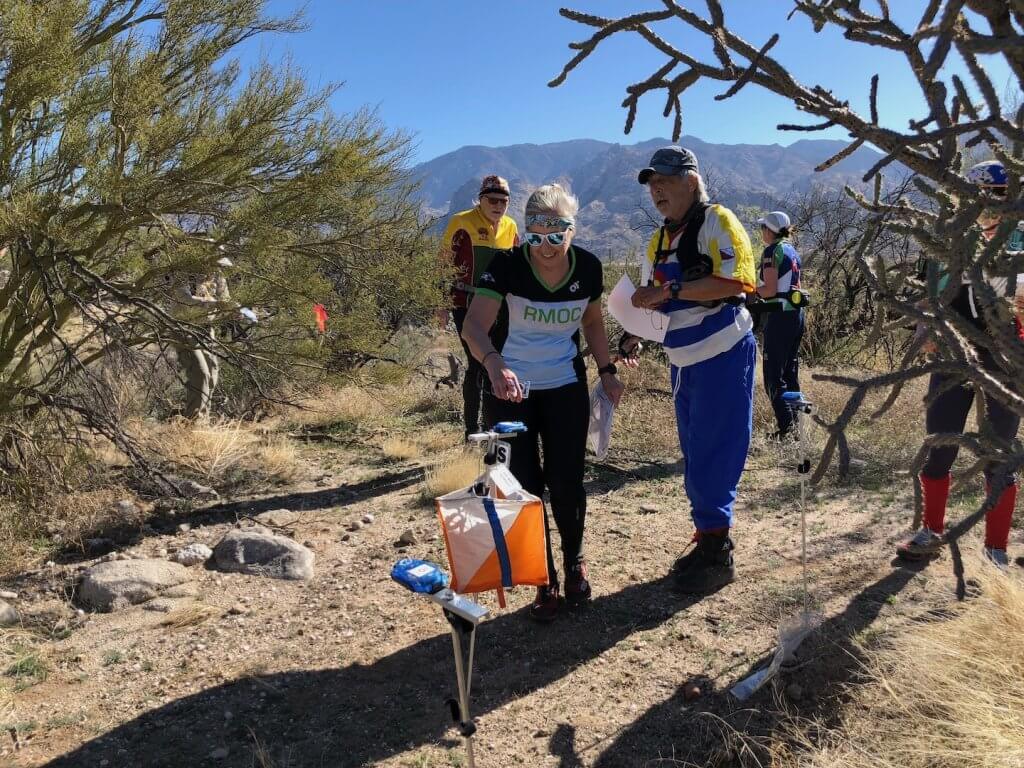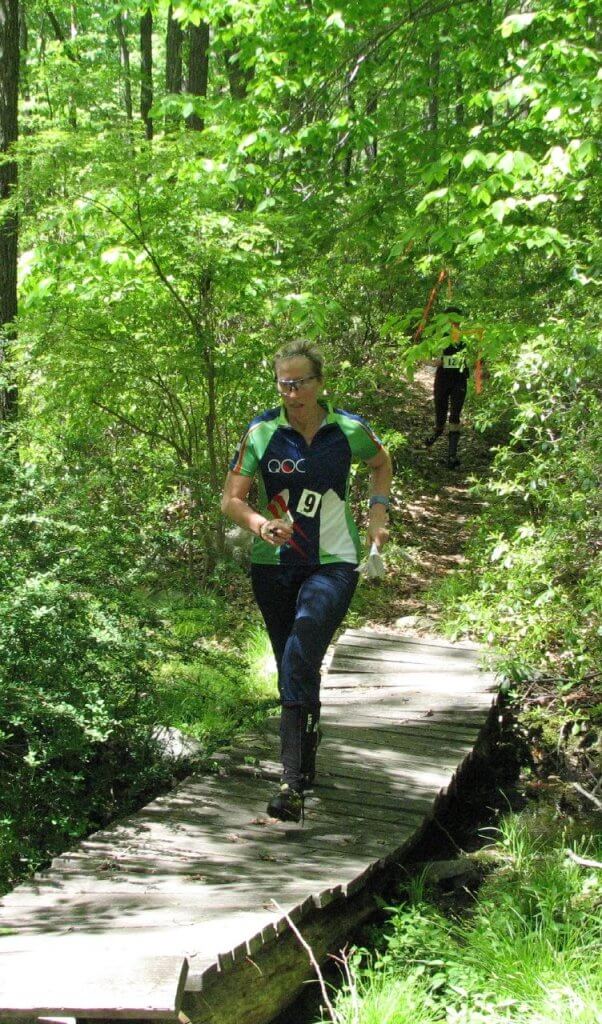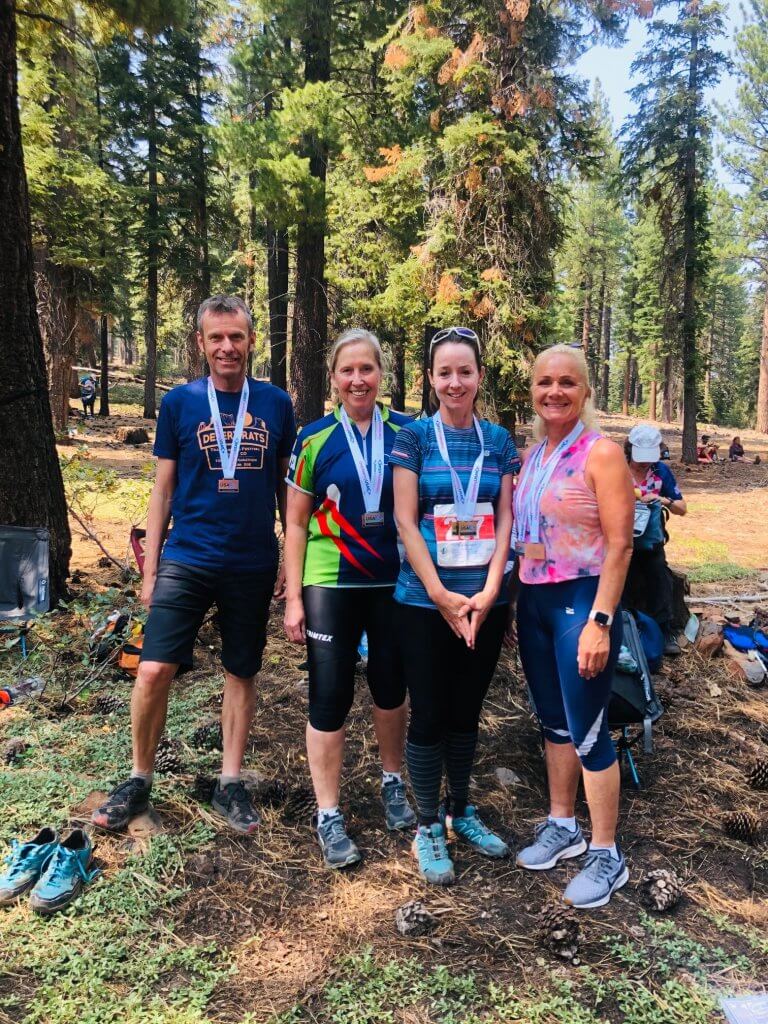
This is a transcript of an interview with Kris in May, 2025. It has been edited for clarity and length.
Cristina Luis: Kris, thank you for talking to me and answering my questions. Right off the bat, I know that you have a fun orienteering origin story.
Kris Beecroft: I do.
Now’s your chance to tell the whole world that story.
My mom was Norwegian and she wanted one of her children to know what it was like to live in Norway, and they chose me. I don’t know why.
So I went over in June of ‘75 and …
How old were you then?
Was I 12? [mental math] No, I guess I was 13.
And so within two weeks of getting there, I went to an orienteering summer camp with my cousin Lene, Lene Skielboe, who also does orienteering in Copenhagen. The orienteering camp was put on by Tyrving. I had zero idea what orienteering was. I had no clue. And so we went to this camp. It was a week long camp up in the mountains. We camped out in tents. I’d never camped out in a tent before in my life. And I just remember this one exercise where they put this huge hand-drawn sort of symbol map on the side of the building and it had the control locations circled and it was like a memory-O.
So you had to look at it and figure out where you were going and run out into the terrain, find the control, come back, get your next one. And then at each control was a letter. And so then you had to come back and put the letters together. It was in Norwegian. I’d been in the country for two weeks, so I failed at that. But I just remember that exercise. I was like, “Oh yeah, I’m hooked on this.”
And so this was in the forest, not like a park or urban area?
It was up in the mountains where we were all staying and camping, and then it was the woods right next to it. And yeah, I just fell in love. And that whole week, it wasn’t training, it was like a beginner orienteering camp like getting you started kind of thing and…
Like Orienteering games.
Just games, yeah.
I remember one time we walked on a trail, led by this guy called Kristoffer Staver. He was a big name in early orienteering in Norway. He and his brothers were very involved in forming the infrastructure of orienteering in Norway. Kristoffer and his wife Elvy, they’d walk down the trail and point out features on either side we’d have to match it up with our map.
And so then you spent a whole year in Norway.
I spent a whole year in Norway. I ran orienteering that whole year with Tyrving. I did Sørlandsgaloppen with them. We took buses over to events in Sweden. We had training camps. We had “vintertrening” at night running around the streets and the street lights. Yeah. Everything about that was just magical.
So obviously a life-changing year for many reasons.
Completely life-changing.
And so you came back and your mom was not an orienteer before you were.
No. She had done orienteering when she was a kid. And she belonged to Tyrving, but she did track and field. I think high jump was her big thing. And she actually won medals. She was good at high jump, but her sister and brother were huge into orienteering when they were younger with Tyrving. They were all members of the club, each doing their own thing. So she knew what orienteering was, she just had never really been into it.
I came back and all along she knew I was orienteering. I came back and said, “I really want to try and keep doing this. I really love it.” I have no idea how she found the Quantico Orienteering Club. Pre-internet! Quantico used to have little blurbs in the Friday weekend section of the Washington Post. So I guess she found one of those and we went down to Mawavi Happyland in Prince William Park and it was me and mom and a bunch of Marines and we walked up and they were like, “Can we help you ma’am?” My mom was like, “We’re here to do orienteering.” So she used to go and just wait for me and then after a couple of times she’s like, “I’m just going to go for a walk in the woods.” And she would take a map and she would do it and so soon she was orienteering too.
Right. Reluctantly at first…
Yeah. Yeah.
So we kept orienteering. And then there was a guy at Quantico at the time, Phil Menagh, who was a Marine there. I guess he saw promise in me or was encouraged because they didn’t have any young people at all in the club, and so he started teaching me the basics and how to do things. And then the next year, I think it was ‘77, the US champs were at Pocahontas State Park right down here in Richmond.
I went and I won my age category. And then of course I was completely hooked. Yeah.
So, at that point you were 14 or 15.
Yeah.
Okay, and so that was the beginning. Hooked in Norway, hooked again in Virginia, and then did you just keep doing it? Did you have any gaps or do you just keep orienteering, even all through college?
Yeah, I was always orienteering except while I was pregnant. I kept orienteering in college because I got to Virginia Tech and they had a little club that Ed Jaeger had been part of and sort of started and so I came down there and I didn’t even know–I picked Virginia Tech because it was an in-state school. I didn’t know they were orienteering down there, so that was all just a bonus. And there were five or six stalwarts down there and we put on a couple of events and we would travel to events. We went out to St. Louis once, we went to West Point once. So I managed to orienteer the whole time I was at school, too. That was good.
I’ll tell you this. I went through the worst parts of my marriage when my husband was like, “I don’t want you orienteering blah blah.” So, I tried to tone it down for a while. But then I was like, “[redacted] you, I’m divorcing you and going orienteering.” You can put that in. I don’t care.
Because that’s important for people to see, that you can go through a time of life where things are harder.
It was harder. Although, I will say I was six months pregnant with Caitlin, I think. And I was a control monitor for the Men’s Team Trials or something. I’ll have to look it up. But yeah, I was sitting there just so big, sitting at the control.
April of ‘87. That was before I started recording on Attackpoint. Now I’m sad I didn’t record an Attackpoint sooner than I did because I keep wanting to go back and look things up. I’m like, “I wasn’t on Attackpoint.”
Because Attackpoint is like a diary.
It’s like my diary.
Yeah. I have 23 years.
I go back and I’m like, “My god, look at all this stuff I was doing.”
There are times I read things and it brings back all these little memories.
Yeah. I agree.
All right. But at some point you were on the US Team.
Yeah. I made the US team for the first time when WOC was in Bendigo, Australia. What year was that? ‘85?
Yeah, ‘85
The team trials were at West Point. And the only cover of ONA [Orienteering North America] I’ve ever made was from that Team Trials. It was like me and Peggy and Kristin Hall and someone else sitting on a stone wall. I was actually first alternate, but Kristin Hall was starting high school. She made the team. But I think her parents said no, she could not miss going to school for this. She was not happy at all. But I was very happy because that meant I got to go.

Was this your first international experience since Norway as a kid or had you gone places?
Yeah, probably. This was before I actually met my now ex-husband. I met him in March the night before I was leaving for Australia. We went on our first date and I think I told someone in Australia, “That’s the man I’m going to marry.” And then later in our marriage when he started complaining about orienteering I was like, “Dude the day after our first date I left for a month to go orienteering.”
Should have figured that out then.
And then when he asked me to marry him, I told him, I’m like, “Okay, I just need you to understand I am never going to stop orienteering.” Like I literally told him this. I am never not going to orienteer. And he said, “Okay.” And then he went back on it.
This is a good lesson for readers.
Yeah. Yeah.
This is why pre-marriage counseling makes a lot of sense. Make sure everyone’s on the same page about these things.
Yeah.
Kids and orienteering.
And finances.
Right, finances, kids, orienteering, in some order.
And how was the WOC experience in Australia?
It was great. We went the week before. We were over there, a week ahead of time or a week and a half ahead of time or something and went to the Victoria Championships the weekend before and then did some training in between. And then it was WOC and it was all great. We were staying in dorms on some college campus. And I think I was only running the relay.
There was a sickness that ran through the campus and a lot of orienteers got very sick and I was one of them. And so the night before the relay, I was up all night vomiting. And I came out of the bathroom at 5:00 a.m. And Peter, who was the coach that year, was standing there and he’s like, “You’re not running today, are you?” I’m like, “No, I’m not.” But there were people getting off the buses that were taking runners to the arena. They were getting off the buses. They’re like, “You need to stop the bus. I need to vomit.”
Okay that’s bad.
It was bad. So yeah, I didn’t get to run.
But you did a lot of orienteering.
Yeah, we did a lot of orienteering. I love the terrain. It was gold mining terrain.
At this point in the interview Kris and Cristina started perusing the November, 1985 issue of Orienteering North America. Check it out, you might recognize quite a few orienteers who are still active today!
Was it just an individual and a relay? Is that it?
Yeah, I believe so. That sounds right.
And then did you do another WOC?
In Norway. Was it ‘97? Let’s go into the wayback machine, shall we?
‘97 was in Norway. In August.
Did you like Norway?
We’ve been sucked into another issue of ONA.
“Norway’s hot WOC”. Yeah, it was so freaking hot that year. Yeah. I had horrible horrible times.
Was it good to be running in Norway or did you find it was just so hard?
No, it was fun. We had a fun time.
Did you act as a translator?
Yeah. And now I’ll say I had traveled internationally before Australia. You just made me think of that when you said translator. We went to the university championships.
We went to university championships in Denmark. When was that? ‘84. I have to look it up. ‘83 or four. I think ‘84 and then we went to O-Ringen after that.
And so that was it for WOC then…
That was it for WOC.
but you kept orienteering…
Kept orienteering, still orienteering to this day. Then I started volunteering. In Quantico I was president twice, I think vice president a couple of times, secretary, newsletter editor, even while I was in college. And then I was course setter for some A meets, I was meet director for some A meets. I think I was meet director for a North American champs at some point. Yeah I just started doing more administrative stuff.

And eventually that took you to the OUSA board.
Then to the OUSA board and presidency for two terms. Then I was president of RMOC a couple of times. I wanted to give back to the sport.
You have a good organizational mind and you use that to give back to the sport. That’s what you do.
And so are you still involved then with clubs where you are now?
Yeah. Yeah. Not so much with Quantico because they’re so far away and they’re so freaking big. They don’t need my little baby help. I help run events with the Central Virginia Orienteering Club based out of Richmond. It’s a very tiny club. But I’m setting courses in June.
And you helped with The World Games a few years ago.
Where I let you down so horribly. [Kris got Covid partway through the week and had to leave early.]
No, not exactly, you played a key role in the organization and execution!
So now you’re an adult. Your kids have been out of the house for a while. Not that parenting is ever done, but the kids are out of the house. And you can travel to events. What are your favorite places to go orienteering?
Scotland.
Yeah, you like the Scottish Six Days. Which is one of my favorites, too. I love it.
My favorite. I looked this summer, but with the big wedding [Kris’ son is getting married] in September, I can’t afford it because I’m paying for most of the wedding.
Yeah, it overlaps with school for us.
So, yeah. Yeah, Scottish Six Days for sure. I also do love what’s it called? Like the kettle moraine terrain around Michigan.
Wisconsin and Michigan. Yeah,…
Yeah, I love Wisconsin. Those Cat maps. Love them.
Those are really good.
And, you know, I like Scandinavia fine. I don’t know. I wouldn’t say it’s my favorite.
I think Norwegian terrain… I mean you learned in what I consider some of the toughest terrain.
Yeah.
Especially Tyrving, on the west side of Oslo, it’s hard to move.
Yeah. No, that’s it. It’s hard to move.
There are other places, parts of Sweden that are technically as difficult but it’s easier to move.
Yeah.
Okay, Scotland.
Yeah. I would say Scotland. That’s my favorite.
Yeah, Iook at what my drink is sitting on! [Cristina pulls up a Scottish Six Days Oban 2011 slate coaster and shows it to Kris]
I don’t have that one, but I’ve been to Oban.
Yeah, because they’ve been back there.
Yeah.
I’d love to go back.
We should plan for the next one. It should be in ‘27.
‘27. Sure.
Pencil it in.
Maybe we’ll leave it with that everyone should join us ‘27.

Okay, but for real, do you have any final thing to share with our readers?
My life has been completely shaped by orienteering.
I don’t know what my life would have been like if I didn’t have orienteering in my life, I have no idea. I can’t even imagine what that’s like. But ever since I started in Norway, it’s like almost all of my vacations are wrapped around orienteering. When I plan out my year, it’s like, okay, where are the big orienteering events this year? What am I going to hit this year in orienteering? For local events I have them all planned out each season. I work my other life events around those so that I don’t miss them. So yeah, I don’t know what my life would have been like without orienteering.
Right. And you can say it’s shaped your relationships.
It shaped my relationships, for sure. My traveling for orienteering was a big reason for my divorce, because I just didn’t hang around the house all day. And, you know, I do adventure races because of orienteering.
And friends, how many of your friends are from orienteering?
And that’s it. I’m going to send you pictures and almost all the pictures have other people in it because it’s… those are like my longest lasting relationships ever are with orienteering friends and then the advent of Attackpoint because it used to be you would see people at a meets and get all caught up in their life right in between A meets and you had no idea what happened and then Attackpoint came along. It’s like now you can follow along the whole time. It’s kind of cool. But those are my longest lasting relationships are orienteering friends and…
Yeah I go orienteering for the thrill of the sport but also for the social part of it. I don’t like going to national events on my own and staying in a hotel room by myself. I like to be with other people and see all my friends and hang out. Makes it fun.

I mean some of the people that you went to WOC with in 1985 are people you travel with now, 40 years later.
Yeah, yeah, Gail and Peter [Gagarin] and I just stayed together at West Point. And where were we? Rochester.
That’s awesome. I think that’s something we miss sometimes with bringing in new people to orienteering, how important that people feel included and that there’s a social aspect.
Right. Right.
It’s so important to make people realize that they can be part of this family. Yeah.
We are a welcoming crowd. I also really think that was a big change in the junior scene when people realized, this has to be more social than just orienteering. We need more social things for the juniors so that they want to come and hang out. So that was a big turning point. But yeah, sometimes I sit and wonder what I would have been like without orienteering.
I don’t know. You probably still would have been cool, but just it would have been something else. I don’t know. Quilting? Or gardening.
Yeah. I don’t know. Sometimes it’s scary to think about how much it has influenced my life. Which is why, again, as an aside, mom’s obituary was so full of orienteering. It shaped the latter half of her life. I mean, she met her husband through orienteering,
So, yeah, it’s crazy.
Yeah. Yeah. We’re all shaped by orienteering. That’s part of why I want it’s great to talk to people like you whose lives have been shaped by orienteering for so long. Because there’s a lot of interesting little turns in life and tidbits.
Yeah. It’s funny too when I meet other people who are into niche anything and they try to explain I’m like, “Yeah, I get it. Trust me.”
